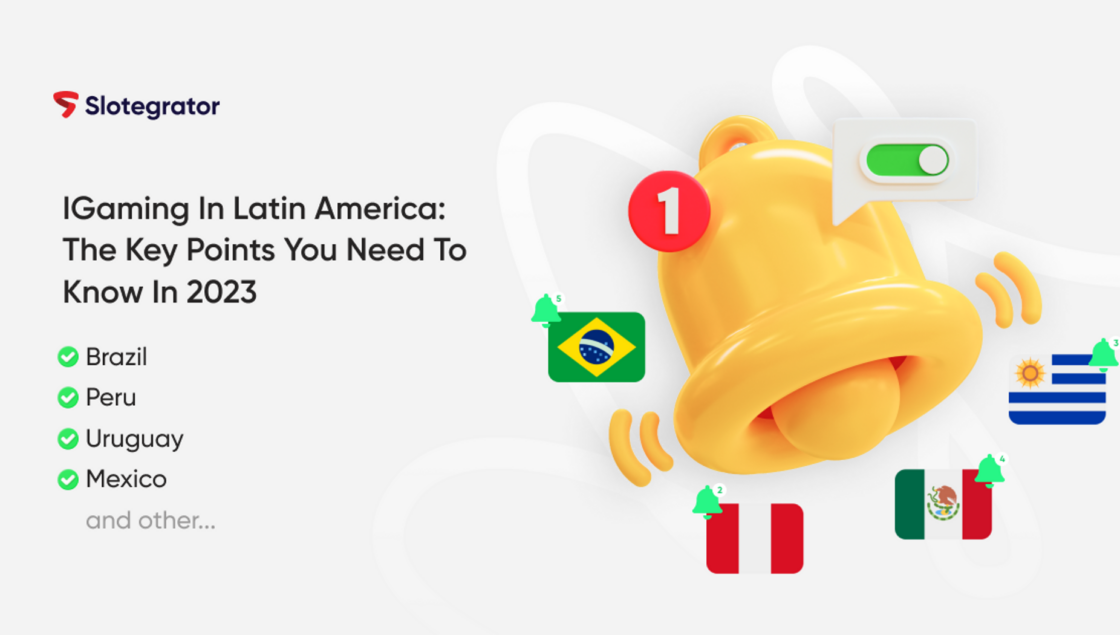Focus on iGaming in Latin America: the key points you need to know in 2023

In addition to the “sleeping giant” of Brazil, Latin America is home to some of iGaming’s most attractive markets. Slotegrator experts have made a brief overview of recent changes in the LatAm market that operators in 2023 should take note of.
With a growing list of countries introducing sports betting regulation to the delight of a football-loving population, Latin America’s iGaming potential is almost impossible to overstate. Brazil alone, often called the “sleeping giant” of iGaming in LatAm, is in the midst of becoming one of the world’s biggest sports betting markets – but it’s far from the only Latin country that operators are excited about.
With that in mind, we’ve been tracking regulatory developments across the region.
Here are some key updates from 2023:
Brazil has enacted a provisional measure to regulate sports betting. The measures include a 16% tax on GGR and a 30% tax on player winnings up to R$2,112 (€395). Once the provisions come into force, Brazil will be among the world’s biggest sports betting markets. According to the latest media reports, the Ministry of Finance has already finalized the draft of the sports betting regulation text. It just has to wait and see how it affects the further development of the gambling industry. In other news from the country, the Brazilian Institute of Responsible Gaming has partnered with the International Betting Integrity Association to combat match-fixing in the country, a sign of the market’s growing stability.
A bumpy road gets bumpier in Uruguay. A proposed online gambling bill in Uruguay has been beset by critics objecting to “weak and insufficient” controls and the fact that only brick-and-mortar casinos will be allowed to run online platforms. In January, another critic leapt onto the dogpile. The Football Association of Uruguay (AUF) would object to any law that doesn’t allow advertising partnerships between teams and online sportsbooks (athletic sponsorships are one of the most effective marketing tools in the LatAm market).
License validation in Mexico. In March 2023, Mexican President Andrés Manuel López Obrador cracked down on the gaming industry. According to him, many casinos have received licenses illegally. In accordance with his instructions, Interior Secretary Adán Augusto López Hernández will review existing licenses issued by individual Mexican states, not the federal government, since Obrador became president. The review will primarily focus on when the license was issued. It should be noted that in the next three years the industry is expected to grow by 33%. One of the events that will affect it is that Mexico is one of the countries where the football World Cup will take place in 2026.
Updating the regulatory framework in Peru. Peruvian regulators have big plans to charge more from iGaming companies – at least three times more than originally planned. The new proposals have been approved by the Commission of Economy, Central Bank, Ministry of Finance, Financial Intelligence Unit and the Congress of Peru. Amendment of the Law 31557 means that there will be a new regulatory framework in the country.The industry may see the finalization of the process before the end of 2023.
The Colombian market continues to renew. Colombia is a regional forerunner when it comes to iGaming. As the first and (so far) only country in Latin America to introduce a comprehensive regulatory framework for online gambling, the country has set a standard for its neighbors to follow. The online gambling regulatory framework in Colombia is still young and developing – new regulations are regularly introduced. For instance, the issue of responsible gambling was only approached and regulated by Coljuegos as recently as 2022. The new set of regulations is intended to combat problem gambling by requiring online operators to, among other things, detect risky behavior and display warning messages, and to enable players to exclude themselves and limit their deposits. At the end of 2022, Colombia approved tax reform and increased taxes on occasional winnings in gaming: 20% withholdings on prizes.
